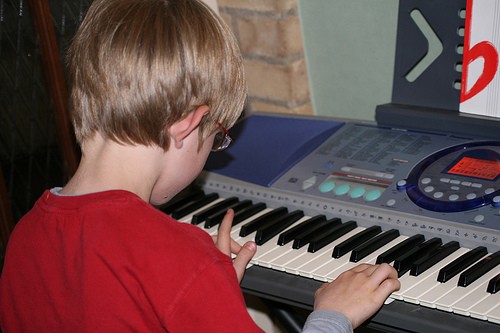
Taking music lessons in childhood benefits the brain in old age, according to a new study.
Researchers at Northwestern University reported in the Journal of Neuroscience that receiving musical training during the early stages of growth had a positive outcome on the brain that lasted well into the last stages of life. During the ageing process, the brain loses its ability to respond fast to changing sounds, thus leading to hearing problems. According to the authors, musical training can help overcome these cognitive declines in old age.
"This study suggests the importance of music education for children today and for healthy aging decades from now," Principal investigator Dr Nina Kraus said in a news release. "The fact that musical training in childhood affected the timing of the response to speech in older adults in our study is especially telling because neural timing is the first to go in the aging adult."
A previous study conducted by the same researchers had found that musicians can process noise faster than non-musicians. Kraus and colleagues also had provided solid evidence to show that lifelong musical experience has an impact on the aging process and had described how musical training helped avoid delays in neural timing caused by ageing.
The new study included 44 people, aged between 55 and 76. The researchers measured electrical activity in the auditory brainstem, the brain area that processes sound, while the participants listened to synthesised speech syllable ("da").
Brain response to speech sound was faster among participants who reported taking music lessons in childhood between four and 14 years. However, the results were not influenced by the fact on whether they played instruments in adulthood. "Being a millisecond faster may not seem like much, but the brain is very sensitive to timing and a millisecond compounded over millions of neurons can make a real difference in the lives of older adults," Dr Michael Kilgard, who studies how the brain processes sound at the University of Texas at Dallas, said. Kilgard was not involved in the current study. "These findings confirm that the investments that we make in our brains early in life continue to pay dividends years later," he added.
The findings support a study published in the Journal of Neuroscience, last year. A team of researchers from the Concordia University found that musical training before age seven helped brain development. Children who started taking musical lessons early had better connections between the motor regions or parts of the brain that control movement of a person.
Apart from that, countless studies in the past have shown that music can help premature babies overcome their initial difficulties in sleeping, feeding and breathing and also help children diagnosed with ADHD concentrate. Interestingly, a study released recently reported that listening to music can help relieve physical pain.








